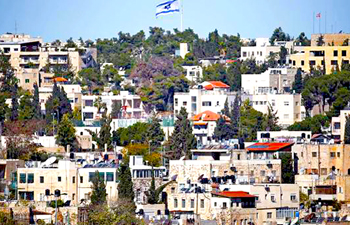Israel began a third day of strikes in southern Lebanon on Wednesday, hours after Hezbollah confirmed the death of a senior commander in an airstrike on Beirut and a Lebanese minister said only Washington could help end the fighting.
Lebanese media reported that Israeli airstrikes had targeted several areas in the country’s south, beginning at around 5am, causing unspecified casualties.
Hezbollah meanwhile said it had launched a rocket targeting Mossad headquarters near Tel Aviv. Sirens had sounded in the Israeli city early on Wednesday, sending residents into bomb shelters, however the Israeli military later said it had intercepted the missile and no casualties or damage were reported.
Earlier on Wednesday, Hezbollah had confirmed that senior commander Ibrahim Qubaisi was among six people killed by an Israeli airstrike on an apartment block in the Lebanese capital Beirut on Tuesday, as Israel had claimed earlier. Israel said Qubaisi headed the group’s missile and rocket force.
Israel’s offensive since Monday morning has killed 569 people, including 50 children, and wounded 1,835 in Lebanon, health minister Firass Abiad told Al Jazeera Mubasher TV. Tuesday’s attacks came after Monday’s barrages racked up the highest death toll in any single day in Lebanon since the 15-year civil war that started in 1975.
Israel’s new offensive against Hezbollah has stoked fears that nearly a year of conflict between Israel and the militant Palestinian group Hamas in Gaza is escalating and could destabilise the Middle East. Britain urged its nationals to leave Lebanon and said it was moving 700 troops to Cyprus to help its citizens evacuate.
The UN security council said it would meet on Wednesday to discuss the conflict.
“Lebanon is at the brink. The people of Lebanon – the people of Israel – and the people of the world – cannot afford Lebanon to become another Gaza,” UN secretary general António Guterres said.
At the UN, which is holding its general assembly this week, US President Joe Biden made a plea for calm. “Full-scale war is not in anyone’s interest. Even if a situation has escalated, a diplomatic solution is still possible,” he said.
Lebanon’s foreign minister Abdallah Bou Habib criticised Biden’s address as “not strong, not promising” and said the US was the only country “that can really make a difference in the Middle East and with regard to Lebanon.” Washington is Israel’s longtime ally and biggest arms supplier.
The US “is the key … to our salvation,” he told an event in New York City hosted by the Carnegie Endowment for International Peace.
Up to half a million people are estimated to have been displaced in Lebanon, said Bou Habib. He said Lebanon’s prime minister hoped to meet with US officials over the next two days.
In Lebanon, displaced families slept in shelters hastily set up in schools in Beirut and the coastal city of Sidon. With hotels quickly booked to capacity or rooms priced beyond the means of many families, those who did not find shelter slept in their cars, in parks or along the seaside.
Fatima Chehab, who came with her three daughters from the area of Nabatieh, said her family had been displaced twice in quick succession.









Comments
Add new comment